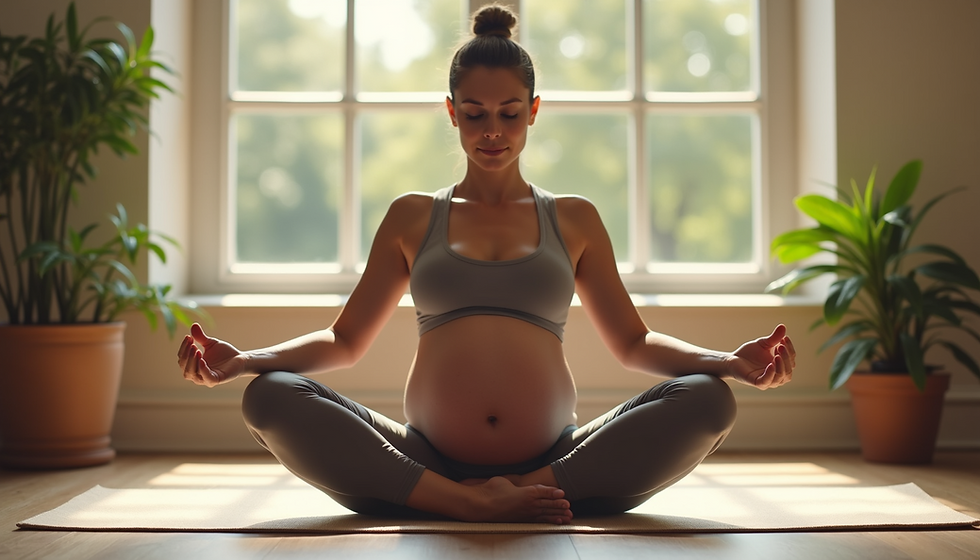Adjustments to Exercise in Pregnancy
- bigboyjesspt
- Aug 22, 2025
- 3 min read
Exercise in pregnancy

In a healthy, uncomplicated pregnancy, exercise is not only good for the Mother and the baby, but is now widely recommended by medical professionals (ACOG, RCOG and NHS all recommend exercise in pregnancy). In the past, it was suggested that exercise was dangerous, and many thought that exercise during pregnancy would increase your chance of miscarriage. In the present, these thoughts and feelings are still active amongst parts of the population. In this article, I will explain what modifications are required to ensure exercise during pregnancy is beneficial, and, most importantly, safe.
Benefits of exercise in pregnancy
I have hyperlinked important authoritative bodies explaining the benefits and guidelines to exercise during pregnancy in the introduction above. In case you can’t be bothered to have a look at those, I will give you a quick overview of why exercise during pregnancy can be good for you:
Helps to manage excessive weight gain
Promote a positive body image
Build/maintain cardiovascular fitness
Build/maintain strength to prepare for physical needs of labour and motherhood
Improves mood
Improves sleep quality
When NOT to exercise in pregnancy
With all that being said, there are certain cases in which exercise during pregnancy should not take place. Whether or not these conditions are present, it is always recommended that you check with your medical health professional that it is safe to partake in exercise for your pregnancy. The following list is not exhaustive, but if any of these conditions are present then exercise is likely to be a no-go for you.
Such conditions include:
Preeclampsia
Multiple gestation at risk of premature labour
Placenta Praevia after 26 weeks
Incompetent Uterus
Persistent bleeding in second or third trimesters
Adjustments throughout your pregnancy
Assuming that everything is healthy and normal with your pregnancy, you still need to adapt the way you exercise, especially if you exercised intensely before.
Reduce the intensity: Think of pregnancy as your ‘off-season’. This means less volume, less load, less stress on your body (don’t you think your body has enough to cope with, you know, being pregnant and all?). For resistance training, aim for reps of 10-15, 1-3 sets.
Reduce the impact: High impact = high chance of injury and increased pressure on the pelvic floor. Thanks to the lovely hormone, relaxin, preparing your body for childbirth, your joints are less stable during (and shortly after) pregnancy - increasing the risk of injury. In addition to this, the growing baby and uterus is applying increasing pressure on your pelvic floor. Considering this, and that high impact activity will produce further pressure on the pelvic floor, it’s recommended to avoid anything high impact if possible. I stopped running at 18 weeks pregnant, once I realised the stress it causes on the pelvic floor.
Avoid: Crunches and other exercises with excessive flexion of the spine and intra-abdominal pressure, uncontrolled twisting, movements where you can lose your balance and fall over, exercising whilst lying down (after 1st trimester), holding your breath on exertion (valsalva maneuver). We also want to avoid putting too much pressure on our abdominal wall or overstretching the abdominal muscles, as these can likely increase the chance of developing diastasis recti - a large separation of the abdominal muscles. After my first trimester, I stopped assisted pull ups and dead hangs, even though I could do unassisted pull ups before my pregnancy.
Final Advice
This is not an exhaustive guide on how to exercise whilst pregnant. This is simply a brief summary to give anyone who is a bit confused some direction. If you are looking for a personal trainer, I would highly recommend one with further qualifications in pre and postnatal training, as unfortunately the PT qualification just doesn’t have enough information on how to train pre and postnatal women.
The final thing I will advise to any pregnant woman wanting to start/continue exercise during her pregnancy is to LISTEN TO YOUR BODY. Tired? Rest. Painful? Don’t do that. Doesn’t feel quite right? STOP. If you need any help or guidance, don’t be afraid to ask.



Comments